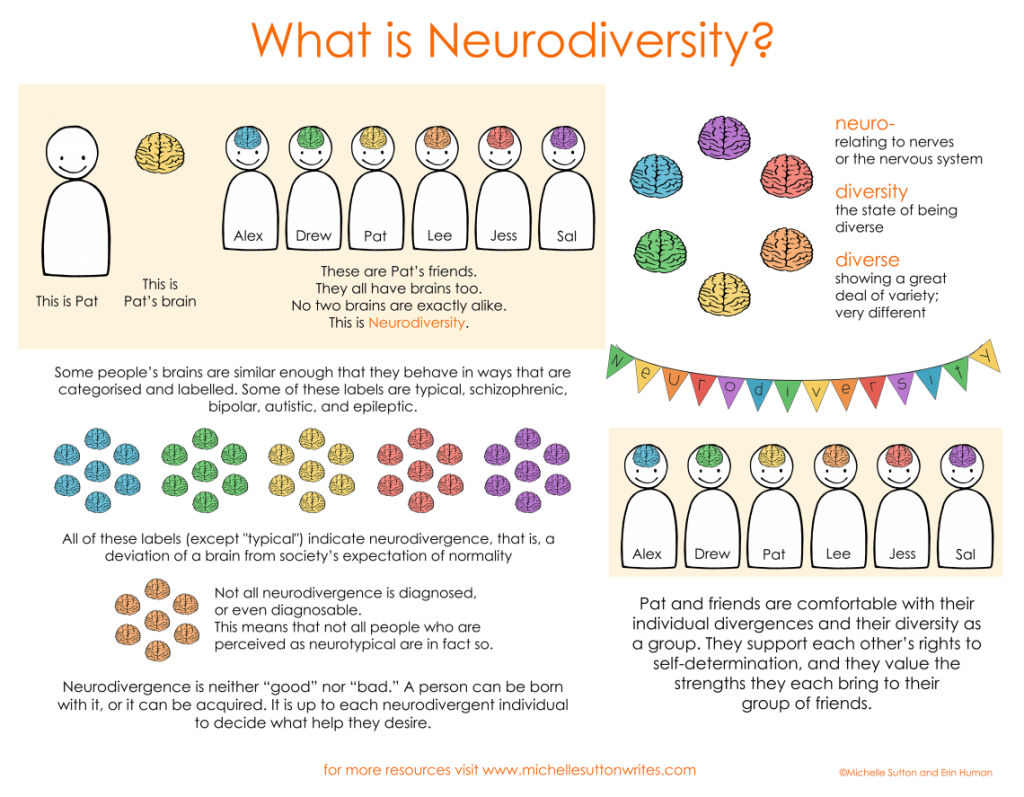Neurodiversity refers to the natural diversity of human minds. It is a biological fact that we are diverse in our minds, just like we are in ethnicity, gender and sexuality; neurodiversity recognises that there is not a wrong or right way for a brain to work. It represents the whole spectrum from neurodivergent to neurotypical individuals.
Neurodiversity was a term created to embrace differences and to encourage them, there are a wide range of ways that people respond and perceive the world around them.

What does neurotypical mean?
Neurotypical refers to having a mind or functioning that falls within the society standards of what is deemed “typical”, “common” or “normal”. Neurotypical is the opposite of neurodivergent, it is not a negative word but a neutral one.
What does it mean to be neurodivergent?
Neurodivergent is an umbrella term for individuals who have a brain that diverges from what is typical; it can be acquired or genetic, an intrinsic part of you or not.
Every human brain on the planet is as unique as each fingerprint. It follows that there is a virtually infinite diversity of humans on the planet, with infinitely diverse minds complexified further by experience in equally diverse bodies.”
Judy Singer – Neurodiversity Pioneer
Being neurodivergent means that an individual may think and learn in a different way to others.
Neurodivergence has a wide spectrum that covers a range of neurological conditions such as but not limited to Autism, Dyslexia, Dyspraxia, ADHD, Tourette’s, and social anxiety.
For some their neurodivergence can mean that they are better at some things than many other people and for others additional support or adjustments are required.
It is estimated that around 1 in 7 people are neurodivergent
My child maybe neurodivergent – what can I do?
- If needed/wanted seek assistance:
- Speak to your GP – it can be useful to have a diary of behaviours.
- Get support from school/nursery and peers.
- Research online and approach charities for support e.g Autism UK
- Be open and straightforward – involve the child or young person.
- Raise your child to be confident in themselves; encourage their skills and celebrate diversity.
- Work closely with likeminded families.
- Seek help as a grown-up for support; you are likely to need to parent differently to what you expected or experienced as a child.
- Questions everything you thought you knew about parenting.
- Accept your child or young person; parent from a place of possibility and not fear. Many parents experience a period of what they describe as grief after a diagnosis, it can take time to accept and reframe parenting – know you are not alone in this.
If your child or young person is neurodivergent that means their life may not follow the path you envisioned and you are finding a new “normal”. Your child or young person is exceptional and you are raising them in conventional world.
How can Happy Confident Kids help my child or young person if they are neurodivergent?
We all want to give our children the self-esteem and skills to become the best version of themselves. We work with children and young people who are both neurotypical and neurodivergent; we have special tools designed to help children and young people that are neurodivergent. All our sessions are tailored for the individual to help them understand, recognise and regulate emotions where needed; leading to greater happiness and confidence for both them and the people around them.
For support and more about our 1-2-1 coaching for children and young people please contact us and follow us on social for help along the way.

Leave a Reply